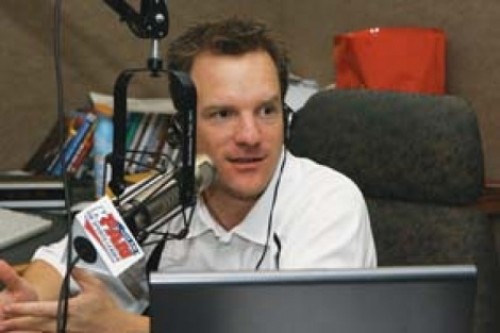Sports Radio | Number Cruncher: David Locke brings a new statistical spin to sports-talk radio
By Geoff Griffin“I use them to prove a point,” Locke says of the stats he cites, “but, very rarely do the numbers lead me to form an opinion.”
But, at least he has some rationale once he forms his opinion. That marks a huge step forward in the world of sports-talk radio, which has traditionally been about how colorfully the host expresses, rather than backs up, his opinions, and when saying things like, “That team really needs to step it up and play like they want it,” qualifies as in-depth analysis.
Howard Cosell once said, “Sports is the toy department of human life.” Locke is not only bringing in hard numbers to explain how the toys work, he’s bringing in numbers that can’t easily be observed or tallied. He dabbles in digits that weren’t even considered in the basketball world until after the publication of Michael J. Lewis’ 2004 baseball book, Moneyball: The Art of Winning an Unfair Game. The basic premise of Moneyball is that most traditional baseball statistics aren’t worth the paper they’re printed on, and much of the sacred knowledge about the national pastime lovingly handed down from generation to generation turns out to be mere superstition when exposed to the rational light of advanced scientific analysis. Locke says he’s trying to apply Moneyball to the NBA, and for a generation of fans who have read the book or can access the new types of numbers on a variety of Websites, anything short of a close look at the figures that explain wins and losses is just so much talk on talk radio.
During the recent series with the Lakers, Locke TiVo-ed and re-watched every game the next night to break down and record results for every play. His days consist of phone calls to connections around the NBA and cruising Websites that crunch mind-boggling numbers to the level of advanced regression analysis. By 3 p.m., he’s able to come up with an extended assessment of something like whether the Jazz are settling for too many “non-paint 2s,” resulting in a “use of possession” number mere hundredths of a point below the NBA average, which ends up being huge over the course of a 48-minute game. The facts are there to be found if you know where to look. Otherwise, you’re relying on opinion, emotion, a few memorable plays and traditional stats like scoring averages or shooting percentages—all that stuff that’s so … well, so 20th-century.
Locke is the first to admit that his first job is to entertain, and “numbers on the radio can be pretty boring.” But he offsets the stats with what is at times, a hyperactive, perhaps even manic, on-air persona.
“Anybody can break down numbers, but [Locke] inserts so much passion into it,” KFNZ programming director Scott Garrard says. “He talks the numbers, but he brings so much emotion to the table. To that extent, he’s the complete package.”
Locke says he’s not aware of anyone else across the country doing the same type of show, “which either builds me up or is to my detriment.” So far it’s been a build up in Utah. Even though Locked on Sports has been on the air less than a year, the show has already made it into the Top 5 among men age 25-54 for all AM and FM afternoon drive-time shows in this market. That shouldn’t come as much of a surprise, since Locke consistently topped the Salt Lake City radio ratings during the mid-’90s before leaving to work in Seattle for nine years. He was already a known brand when he returned to the Beehive State.
The numbers are up for the guy who comes up with numbers, but he recognizes that “sometimes maybe I’m just being an idiot, and I don’t really know what I’m talking about with all these numbers.” Then again, “I think sometimes (Jazz general manager) Kevin O’Connor is pretty receptive to me and my silly ideas.”
O’Connor could do a lot worse than listening to Locked on Sports.
LOCKED ON SPORTS KFNZ 1320 AM, Weekdays 3-6 p.m. TheFanSports.com
More by Geoff Griffin
-
A Family New Year
How to ring in 2020 with revelers of all ages.
- Dec 25, 2019
-
The 12 Arts of Christmas
A delightful dozen options for your holiday entertainment needs.
- Nov 27, 2019
-
Season Kickoff
A look at what's new, or old but great, at Utah's ski and snowboard resorts for the winter season.
- Nov 13, 2019
- More »



